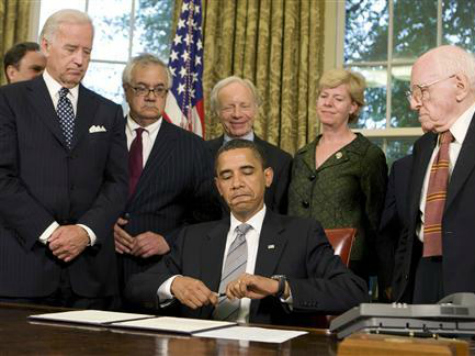
On Friday, George Will – hardly the most militant of conservatives – issued a column lamenting the “lawless president.” He wrote that the threat of executive power is now greater than “at any time since the Founders, having rebelled against George III’s unfettered exercise of ‘royal prerogative,’ stipulated that presidents ‘shall take care that the laws be faithfully executed.'” And he added, “Institutional derangement driven by unchecked presidential aggrandizement did not begin with Barack Obama, but his offenses against the separation of powers have been egregious in quantity and qualitatively different.”
Will, of course, is not the first to notice the unchecked power of the executive branch. In my new book, The People vs. Barack Obama,, I explain that Woodrow Wilson’s vision of government – a government in which “self-government” consists of delegating all power to a centralized authority – has now been attained. America now has “a president with almost ultimate power and a huge cadre of agents to implement it, a horde of servants so huge that the president can always place blame with a low-level flunky.”
Momentum is now growing around the notion that executive power must be curbed. So, how do we stop all of this?
Impeachment. Andy McCarthy, in his new book Faithless Execution, suggests that Obama is guilty of impeachable offenses. Which is certainly true, given that I argue that some of Obama’s crimes would put him behind bars were he in the private sector. But he isn’t the only one throwing the “i-word” around. South Dakota Republicans passed a resolution last week demanding impeachment. Even Senator Lindsey Graham (R-SC) has mentioned impeachment in the context of the Bowe Bergdahl swap for Taliban terrorists.
Realistically, however, impeachment is near-impossible. In the history of the United States, just 19 federal officials have been impeached in the House, and just eight have been convicted in the Senate. Even should Obama be impeached in the House, he would have to be convicted by 2/3 of the Senate, a non-starter.
Besides, Obama isn’t the whole problem. An executive branch of nearly 3 million employees and with zero accountability is.
Legislative Standing. Will makes the case that the judiciary should allow legislative standing so that Congress can stop the executive overreach. To do so would require, according to Will, four conditions: a majority of one chamber of the legislature authorize the lawsuit; that a private plaintiff be excluded; that Congress has no power to repeal the law; and that the injury “amounts to nullification of Congress’ power.”
There are two problems with this solution. The first is that Congress will never authorize such lawsuits. The second is that neither will the judiciary. How in the world would a Court rule that Congress has no power to repeal a law or revise a regulation? Of course Congress can. The problem is that Congress doesn’t.
Constitutional Amendments. Mark Levin, in The Liberty Amendments, has made the case for a series of Constitutional amendments that would seriously curb the power of the federal government in order to restore “constitutional republicanism and preserv[e] the civil society from the growing authoritarianism of a federal leviathan.” Levin asks for a convention based on state applications. Any amendments from such a convention would have to be approved by three-quarters of the state legislatures. Surely, this would be the most comprehensive and long-lasting change possible.
Expanding RICO. In my book, I make the case that Congress ought to amend the Racketeer Influenced and Corrupt Organizations Act of 1970 to allow private civil suits against the executive branch. That would require an extension of RICO law to “criminal enterprises” within the executive branch, and an extension of RICO to new predicate acts; American citizens could then file lawsuits against entire administrations. Brian Terry’s family could sue the Obama administration for Fast and Furious; Ty Woods’ family could sue the Obama administration, including former Secretary of State Hillary Clinton, for the negligent homicides in Benghazi; charitable organizations could sue the Obama administration for the IRS scandal.
State Action. More and more state governments are moving against the federal government’s overreach. Several states have moved against Obamacare. That isn’t technically nullification; it’s state governments refusing to be used as agents of the federal government. But what happens when the state and federal governments come into direct conflict? Former Governor Brian Schweitzer (D-MT), for example, signed the Montana Firearms Freedom Act, nullifying federal gun law. Other states have followed suit. The Civil War and the Jim Crow era discredited the idea of nullification – states claiming authority against the federal government. But states are now looking at the continuing growth of a massive federal government and looking for solutions.
Are any of these solutions possible? Only if the American people are willing to see the executive branch for what they are: a budding elected dictatorship, no matter who runs the show.
Ben Shapiro is Senior Editor-At-Large of Breitbart News and author of the new book, The People vs. Barack Obama: The Criminal Case Against The Obama Administration (Threshold Editions, June 10, 2014). He is also Editor-in-Chief of TruthRevolt.org. Follow Ben Shapiro on Twitter @benshapiro.

COMMENTS
Please let us know if you're having issues with commenting.